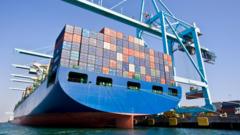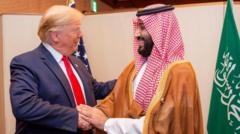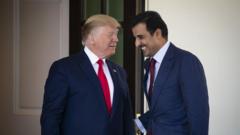**Beijing's refusal to capitulate to U.S. tariff pressures is rooted in national pride and strategic economic positioning.**
**Beijing Stands Firm Against U.S. Tariffs Despite Economic Pressure**

**Beijing Stands Firm Against U.S. Tariffs Despite Economic Pressure**
**China's leaders assert resilience in face of trade war, emphasizing independence and negotiation channels**
In response to the ongoing trade tensions with the United States, Beijing remains resolute against Donald Trump's tariff impositions, largely because it believes that giving in would compromise its national dignity. China's leaders characterize the U.S. administration's approach as bullying and are prepared to withstand significant economic impacts from these tariffs. While the U.S. market represented about 2% of China's GDP before the start of the tariff war, the Communist Party is keenly aware that the tariffs will have repercussions for U.S. exporters as well.
Undeniably, China finds itself at a delicate juncture, grappling with its internal economic challenges that include a real estate crisis, regional debt issues, and rising youth unemployment. Despite these challenges, the government projects confidence to its populace, reinforcing the message that it is well-equipped to handle the pressures originating from Washington.
In a recent dialogue with Spanish Prime Minister Pedro Sanchez, China's leader Xi Jinping articulated a collective stance with the European Union against what he termed the "unilateral bullying" from the U.S. hours before China raised its tariffs on U.S. goods again. While Xi is scheduled to visit Malaysia, Vietnam, and Cambodia—nations feeling the pinch of U.S. tariffs—China is exploring enhanced trade ties with other nations such as South Africa, Saudi Arabia, and India. Talks are also underway to negotiate a removal of tariffs between China and the EU, indicative of China's strategic maneuvering in the global landscape.
Analysts argue that the back-and-forth tariff increases have drifted into symbolic territory, as mutual tariffs have begun to strangle the trade relationships that existed previously. Chinese officials, like Foreign Ministry spokesperson Mao Ning, emphasized this stubborn resolve by invoking Chairman Mao's historical ethos of resilience in the face of adversity, stating: "We are Chinese. We are not afraid of provocations. We won't back down." With historical references made, the call for unity against external pressure seems unwavering, revealing that Beijing has calculated options to resist U.S. demands effectively while sustaining its economic interests.
Undeniably, China finds itself at a delicate juncture, grappling with its internal economic challenges that include a real estate crisis, regional debt issues, and rising youth unemployment. Despite these challenges, the government projects confidence to its populace, reinforcing the message that it is well-equipped to handle the pressures originating from Washington.
In a recent dialogue with Spanish Prime Minister Pedro Sanchez, China's leader Xi Jinping articulated a collective stance with the European Union against what he termed the "unilateral bullying" from the U.S. hours before China raised its tariffs on U.S. goods again. While Xi is scheduled to visit Malaysia, Vietnam, and Cambodia—nations feeling the pinch of U.S. tariffs—China is exploring enhanced trade ties with other nations such as South Africa, Saudi Arabia, and India. Talks are also underway to negotiate a removal of tariffs between China and the EU, indicative of China's strategic maneuvering in the global landscape.
Analysts argue that the back-and-forth tariff increases have drifted into symbolic territory, as mutual tariffs have begun to strangle the trade relationships that existed previously. Chinese officials, like Foreign Ministry spokesperson Mao Ning, emphasized this stubborn resolve by invoking Chairman Mao's historical ethos of resilience in the face of adversity, stating: "We are Chinese. We are not afraid of provocations. We won't back down." With historical references made, the call for unity against external pressure seems unwavering, revealing that Beijing has calculated options to resist U.S. demands effectively while sustaining its economic interests.





















